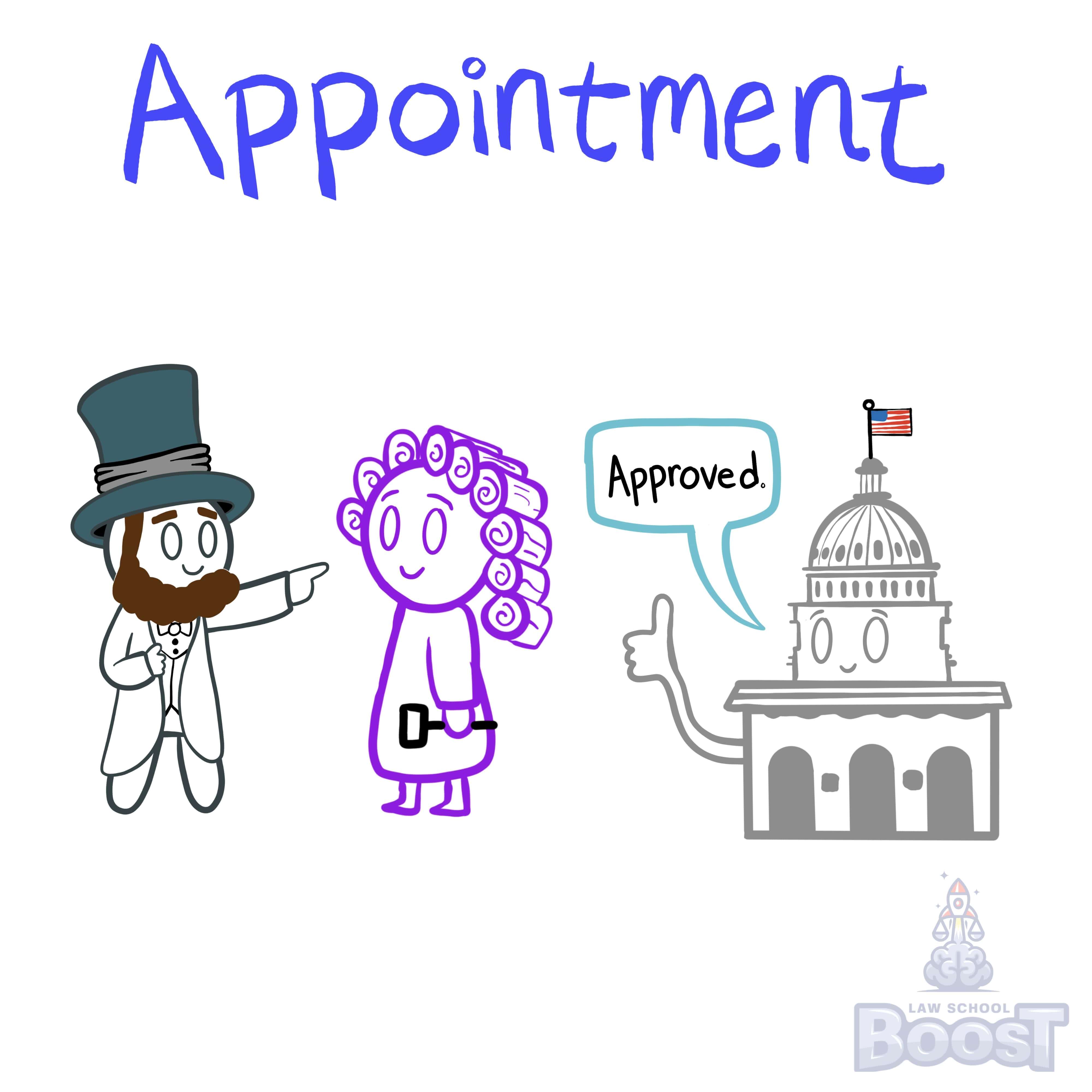🇺🇸
Constitutional Law • Domestic Affairs
CONLAW#032
Legal Definition
The President alone appoints: (1) ambassadors, (2) federal judges, and (3) officers of the United States with the advice and consent of the Senate. Congress may vest appointments of inferior officers (i.e., those that can be fired by officers of the United States) in the President, the heads of departments, or the lower courts. Congress may not, however, give itself or its officers the appointment power.
Plain English Explanation
The President has the power to choose people for certain big jobs with the Senate's agreement. These jobs include ambassadors, federal judges, and other high officials. However, for less important positions, the President, leaders of government departments, or courts can choose who gets these jobs without needing the Senate's approval. But, Congress or its members can't pick people for these jobs themselves.
Hypothetical
Hypo 1: Bob is nominated by the President to be an ambassador to Italy. However, the Senate does not agree with the President's choice. Result: Bob cannot become the ambassador because the Senate's approval is necessary for such a high-ranking position. The President must choose someone else or try to convince the Senate to agree.
Hypo 2: Sam, a private citizen with experience in public policy, is appointed by the President to serve as a special advisor on a temporary presidential commission. Result: This appointment is valid because the special advisor role is a temporary, advisory position under the President’s direct authority and does not require Senate consent.
Hypo 3: Amy is selected by the President to be the head of a new federal department. The Senate debates her nomination and ultimately agrees. Result: Amy's appointment is valid because heads of departments are high-ranking positions that require both the President's nomination and the Senate's confirmation.
Hypo 4: The President wants to appoint Bert, Bob's brother, to a lower-level federal position within the Department of Justice. He decides to let the head of the department make the appointment directly. Result: This is permissible because Congress allows the President to delegate the appointment of inferior officers to heads of departments, illustrating the flexibility in filling less critical roles without Senate involvement.
Hypo 5: Congress attempts to appoint Sam directly to a new governmental agency designed to oversee elections in New Hypoland and Hypofornia. Result: This appointment would not be valid because Congress cannot appoint officers itself. This rule ensures that the executive branch retains the power to appoint, maintaining a separation of powers.
Hypo 2: Sam, a private citizen with experience in public policy, is appointed by the President to serve as a special advisor on a temporary presidential commission. Result: This appointment is valid because the special advisor role is a temporary, advisory position under the President’s direct authority and does not require Senate consent.
Hypo 3: Amy is selected by the President to be the head of a new federal department. The Senate debates her nomination and ultimately agrees. Result: Amy's appointment is valid because heads of departments are high-ranking positions that require both the President's nomination and the Senate's confirmation.
Hypo 4: The President wants to appoint Bert, Bob's brother, to a lower-level federal position within the Department of Justice. He decides to let the head of the department make the appointment directly. Result: This is permissible because Congress allows the President to delegate the appointment of inferior officers to heads of departments, illustrating the flexibility in filling less critical roles without Senate involvement.
Hypo 5: Congress attempts to appoint Sam directly to a new governmental agency designed to oversee elections in New Hypoland and Hypofornia. Result: This appointment would not be valid because Congress cannot appoint officers itself. This rule ensures that the executive branch retains the power to appoint, maintaining a separation of powers.
Visual Aids

Related Concepts
Under Youngstown, when is the President's power as Chief Executive most and least powerful regarding domestic affairs?
What are the limitations of the President's immunity?
What are the limitations of the President's pardon power?
What are the requirements for impeachment and removal?
When may the president invoke executive privilege?
Who has the removal power and what are its limitations?


